Local religious leaders split on Roe — Just like the rest of us — podcast
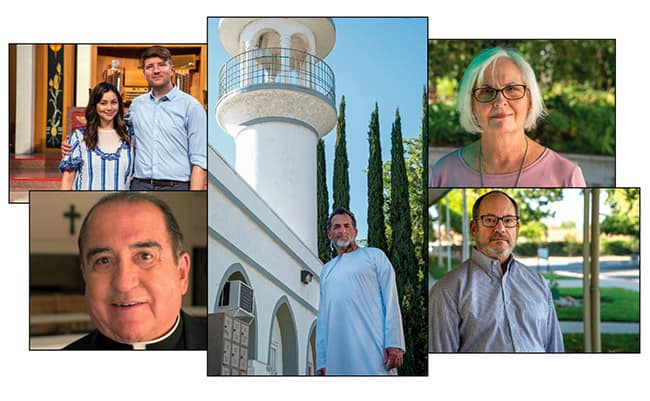
by Mick Rhodes | mickrhodes@claremont-courier.com
Reaction among local religious leaders to the United States Supreme Court decision overturning Roe v. Wade is varied, as one might expect.
But much like the rest of the country, opinions among the five faith leaders we interviewed are about 60/40 in favor of supporting a woman’s right to be in control of her reproductive health.
The COURIER spoke with Cantor Paul Buch, from Temple Beth Israel, in Pomona; Reverend Martha Morales, of Claremont United Methodist Church; Father Charles Ramirez, from Our Lady of the Assumption Catholic Church in Claremont; Claremont United Church of Christ co-pastors Jen Strickland and Jacob Buchholz; and Mahmoud Tarifi, the president of the board of directors at the Islamic Center of Claremont.
We asked each of them the same pair of questions: does your organization have an official position on abortion? And, what was your reaction to the ruling?
Cantor Paul Buch, Temple Beth Israel
Temple Beth Israel does not have an official position on abortion, Buch said, or on most other politically charged social issues.
“Although I will say that many of our community members, both individually and collectively, have long been involved in the effort to secure reproductive rights for women, and by extension their families, in line with our Union for Reform Judaism’s long advocacy in this area,” Buch said.
The Union for Reform Judaism, he said, “has long been at the forefront of promoting, securing, protecting, advancing policies, and the ramifications of those policies, for decades.”
Buch said he wasn’t shocked by the decision.
“We had come to expect it, not only over the recent weeks preceding it after the Alito draft was announced, but just looking at the composition of the Court and understanding the radical right wing conservative agenda to provide Supreme Court justices, and to groom Supreme Court justices, who would be committed to overturning the Roe v. Wade decision,” he said.
“But I think more than anything, people should understand that taking away the rights that had been in place for 50 years is, to many of us, a direct affront to our Jewish principles and our understanding about what qualifies as life, what is defined as life, and the millennia-old idea that the primary focus is on the woman and her health and wellbeing, from before the time of conception, all the way to the actual birth. That the ideas that seem to be at the core of this issue — at least from a religious perspective — are not Jewish values.
“In many ways the way that this whole debate has been framed is, in a sense, anti-Jewish.”
Father Charles Ramirez, Our Lady of the Assumption Catholic Church
Ramirez said the Catholic Church’s position was, “that life begins at conception, and it goes all the way to death. And every human being has dignity, created by God.”
Ramirez was the lone religious leader we spoke to who had a purely positive reaction to the ruling.
“My personal reaction is, great!” he said. “I mean, I’ve been talking about anti-abortion for a long time, you know what I’m saying? I realize that there are people who don’t understand it or want their own way, but I basically think that our country has lost their sense of values for what is good, what is holy, what is uplifting, how to love one another and not be so selfish. I mean, the sexual revolution really did the number on us, I believe.
“And here we’ve got all these problems, millions of abortions that have happened. I think this began way back when, and we’re paying the price for it. And millions of babies have had no rights to have a say. Not even the fathers had a say. The biological father hasn’t had a say, usually, on whether or not the person they were involved in can have an abortion or not.”
Rev. Martha Morales, Claremont United Methodist Church
“We believe that all life is sacred, and we believe that a decision about something as important and life-changing as a pregnancy going forward is something that a woman, her family and her doctor should make together, and that it should not [include] the involvement of government trying to legislate that kind of decision or make a decision like this for a family,” Morales said.
“We believe that abortion should be legal and safe and available to all women, and that it should be rare, and that we should seek other options when a pregnancy isn’t wanted, or will be detrimental to a woman or her family.”
Morales reacted to the ruling much like most women across America.
“I certainly was disappointed,” she said. “I wasn’t surprised. We knew where this was all heading a long time ago. I was discouraged. I found it a really hard week last week.”
Jen Strickland and Jacob Buchholz, co-pastors, Claremont United Church of Christ
The UCC governance structure allows churches to make political position decisions for themselves, Rev. Buchholz said.
“But by and large, the leadership of United Church of Christ is very much in support of a woman’s right to choose and make decisions about her own reproductive health,” he said.
Over the past few months, as it became clear the Supreme Court would likely overturn Roe, both Buchholz and Strickland have been vocal with their congregation about their support for a woman’s right to choose. And, naturally, not all congregants agree with them, they said.
“So there’s not one single view that everyone has to follow, but we are certainly comfortable with sharing our own,” Buchholz said.
But the married couple, who welcomed their first child, a daughter, just nine weeks ago, are in lock step on how they reacted to the news of the decision.
“Well, I think we’ve all been dreading this moment ever since the leak was released, but it was definitely disappointing,” Strickland said. “Also, as a woman, it was frightening and disappointing and really hard to hear, because abortion is not something that anyone looks forward to. It’s not a pleasant thing. It’s not something that anyone plans to do in their life. However, when a woman is faced with a difficult decision like that, something that involves her body, her future, her livelihood potentially, her entire life, she should have the right to make that decision for herself, and to be supported by her family and her community, and not have the government interfere with such a personal, often very painful decision.”
Mahmoud Tarifi, president of the board of directors, Islamic Center of Claremont
“From an Islamic point of view, abortion is prohibited except with certain conditions,” Tarifi said. “Those conditions vary from a mother’s health, to deformity of the child, to issues of very special circumstances of the family, rape, things of that sort.
“Most of the scholars have allowed it for these special circumstances. If it’s before 120 days. Most of the scholars prohibit abortion if it’s beyond four months. That’s when they consider the baby is alive, the baby is a person beyond four months. Meaning his soul … is considered alive over four months.”
Tarifi framed his reaction to the ruling within the lens of America’s increasingly toxic political polarization.
“My personal reaction is it’s really the cat-and-mouse fight we have been witnessing over the past 200 years between Republican and Democrat,” Tarifi said. “Muslims are like the rest of American society; I’m sure we’re not all into one opinion. I myself have my opinion, my wife does, my children do as well. I have two boys and two girls at home, and I have two Republicans and two Democrats in the house. I have to engage them all the time, my wife and I, every dinner and every occasion, whatever is going on in the news.
“You know, there’s a big difference between the core value of a person or a community or a faith, and the game of politics.”



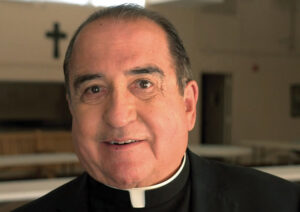
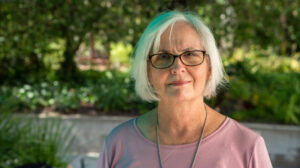
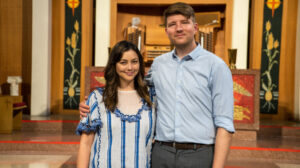
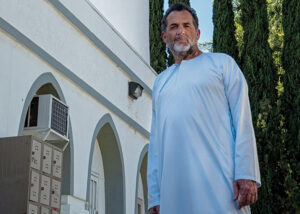







0 Comments